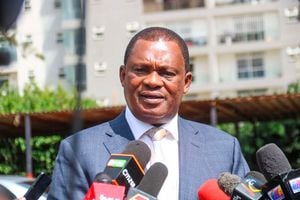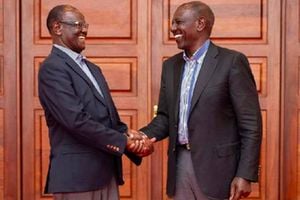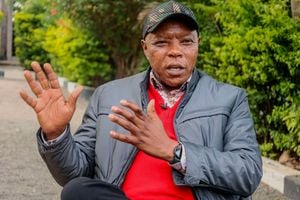
President William Ruto and (inset, right) Cabinet Secretary for Public Service and Human Capital Development Justin Muturi.
President William Ruto is juggling many balls as he struggles to stabilise his Kenya Kwanza government amid a wave of public discontent.
The Head of State is under intense pressure to address the spiralling wave of abductions while contending with internal defiance from within his own government, arbitrary resignations by appointees, demands to rein in unruly allies, social media attacks and feuds among his newfound partners that have exposed his administration.
The President seems cornered into relentless firefighting to tackle challenges undermining his Kenya Kwanza agenda, including frequent cabinet reshuffles to ensure seamless service delivery, barely two years into his term.
A survey by Pan-African research group Afrobarometer shows that trust in the presidency fell by eight points to an average of 52 per cent between 2011 and 2023, while trust in the ruling party dropped to 32 percent, underlining a significant trust deficit in the executive.
In recent months, Kenya has seen a rise in abductions, insecurity, and concerns about human rights abuses, with civic groups denouncing the vices, in which the government denies any involvement.
According to a State of National Security report, there was a 44 per cent increase in kidnappings and abductions between September 2023 and August 2024. The Kenya National Commission on Human Rights (KNCHR) reported at least 82 case of abductions in 2024.
Last Sunday, just as the dust was settling down following the release of four abductees — Billy Mwangi, Ronny Kiplangat, Peter Muteti and Bernard Kavuli — allegedly kidnapped by state agents, Ms Maria Sarungi, a prominent journalist and vocal critic of the Tanzanian government and President Samia Suluhu, was captured in Kilimani, Nairobi and held for several hours before she was released.
It was on the same day when Cabinet Secretary for Public Service and Human Capital Development, Justin Muturi, publicly broke ranks with the government which he serves, and took on the president over his government’s handling of abduction crisis.
The statement by Mr Muturi came as a surprise, since he is a senior government official who appeared to defy the principle of collective responsibility to openly criticise an administration which he serves.
Mr Muturi, however, argued that he was forced to go public since he is a victim of the abductions crisis since his son Leslie Muturi was abducted last year but he was yet to get answers on the matter.
“I am fully aware of the doctrine of collective responsibility, but since I am also a victim of the abductions and I have not got any answers, I have taken this unusual step so that the matter can be debated honesty and openly as a country with a view to finding a lasting solution to this issue which if left unchecked has the potential to plunge the country into chaos and anarchy,” Mr Muturi said.
To further demonstrate the high level of incoherency in the Ruto government, Mr Muturi took the abductions war to National Intelligence Service (NIS) doorsteps, accusing its Director General Noordin Haji of being behind the operation to seize his son.
Political analyst Mutahi Ngunyi, however, observes that the CS’s statement was of a man who had made up his mind to exit the government and only wanted to be sacked to enjoy sympathy in his Mt Kenya backyard.
Multimedia University Lecturer Prof Gitile Naituli cautions that president Ruto’s government cannot win the fight it has picked with young social media users.
“He can’t win that war. You can’t fight a generation. They will think of how to counter you and not how to surrender. This war is preventing him from achieving his agenda yet he has a lot to do. He should find ways of addressing the concerns raised,” said the don.
To add on the nightmare of abductions, President Ruto has also received shock decline of state jobs by individuals he has given state positions, raising concerns as to whether the Head of State, or his officers make prior consultations with the possible appointees.
Former Information, Communications and the Digital Economy CS Margret Ndung’u is the latest high ranking official to decline President Ruto’s appointment, having been nominated as the new High Commissioner to Ghana.
Ms Ndung’u wrote to the National Assembly's Committee on Defence, Intelligence and Foreign Affairs declining to appear for vetting for the post, citing “personal and pressing family matters,” as the reason for declining the nomination.
The Ghana High commission now seems jinxed since prior to Ms Ndung’u’s move, former West Mugirango MP Vincent Kemosi had also declined the same position, citing personal reasons.
Ex-Machakos Town MP Victor Munyaka is also in the growing list of individuals who have declines presidential appointments.
He refused to take up his appointment as the chairperson of the Kenya Animal Genetic Resource Centre board of management.
The President has made several changes in his cabinet since last year’s protests by young Kenyans, with the latest batch having been vetted and approved by Parliament on Thursday January 16.
Political analyst Martin Oloo describes the Ruto administration as a “government that suffers credibility crisis” and lacks identity.
“As long as KK (Kenya Kwanza) has an identity crisis, they will move from crisis to crisis. They have lost clarity on what their main promise was on health, education and economic program. Their taxation policy stifles rather than stimulates the economy,” Mr Oloo told Nation.Africa.
The Head of State is also on the spot for failing to rein in unruly allies who have continued to make “reckless statements,” on many occasions in his presence.
Kapsaret MP Oscar Sudi, Tiaty legislator William Kamket, Dadaab representative Farah Maalim, his Baringo North counterpart Joseph Makilap and Cabinet Secretary for Mining and Blue Economy Hassan Joho are among the leaders who have made charged statements at public rallies, raising political temperatures by asserting that President Ruto would return to office through the ballot or any other means available.
“There is no President who has ruled for only five years in this country. Will this one (President Ruto) be the first one? How will that be possible? Where will we be to allow that to happen?” stated Mr Sudi at a recent public rally.
Mr Kamket, raised the stakes by warning Kenyans that President Ruto could even rule for 24 years, just like President Daniel Moi who ruled from 1978 to 2002.
To critics, the fiery declarations by President Ruto’s political allies have, however, signalled a determination to secure a return to office regardless of the voters’ decision at the ballot, potentially setting the country down the path of anarchy.
“The Kenya Kwanza politics reminisces Kanu days with drums of war only preparing us for ethnic clashes as witnessed in 1992 and 2007,” says political analyst Martin Oloo.
United States International University Lecturer Prof Macharia Munene argues that the people, having lost trust and confidence in the Ruto government, are increasingly bold in demanding that Ruto be accountable.
“This rubs Ruto the wrong way. For the public to regain the lost confidence, Ruto would need to re-examine his relations with the Kenyans. His current inner circle does him dis-service,” Prof Munene holds.
Prof Naituli agrees that president Ruto’s administration faces numerous challenges, but adds that it was not too late to address the situation and have the government stable.
“The problems can still be rectified and the country stabilised. It’s not totally beyond repair. But the chief executive who is the president must do a reset, possibly dismantle the entire government and make a new one,” he said.
Prof Naituli added: “There is need for him to bring in people who are more intelligent than him since a cardinal mistake any CEO can make is to make yourself the most intelligent. That leads to paralysis.”
He says that it was time President Ruto gave his team freewill to work and stop “micromanaging them.”
“He is just a team leader and must be able to crosscheck even his own decisions with his team to get guidance,” adds Prof Naituli.
He holds that President Ruto must avoid “groupthink,” which he noted means patching his administration with his “loyalists and henchmen.”
President Ruto is also facing continued feuds among his newfound partners in the broad-based government which has exposed his administration.
Despite insisting that the broad-based administration involving ODM leader Raila Odinga’s allies has stabilised the country and his government, some of Mr Odinga’s allies have refused to subscribe to the system.
On Friday last week, the party issued a hard hitting statement against the government after a meeting of the Central Management Committee in Nairobi.
Interim party leader Prof Anyang’ Nyong’o warned the officials against making statements that suggest plans by ODM to back Dr Ruto’s re-election.
“After chairing the ODM Central Committee meeting, I want to reassure our members and the public that ODM will continue to be a force for good in the year ahead. We stand firm as the foremost defender of democracy, championing freedom, full participation, transparency, good governance, justice, fairness, and equity,” Prof Nyong’o posted on social media, adding that the Orange Party will remain a distinct political force.
A statement issued by ODM Secretary General Edwin Sifuna, a fierce critic of president Ruto, sought to assure party members: “We must continue to strengthen ourselves in preparation for the battles ahead. Following the largely successful grassroots elections in November at polling units in all the 47 Counties the Party received 41 Appeals.”
President Ruto’s endorsement of a broad-based government incorporating members of the opposition however, contradicts his position during president Uhuru Kenyatta’s tenure.
Then, serving as Mr Uhuru Kenyatta’s deputy, Dr Ruto was the major critic of the then ‘Handshake’ government when Mr Odinga worked with Mr Kenyatta, who later backed his presidential bid against Ruto in the 2022 election.
Today, the president has embraced Mr Odinga and Mr Kenyatta, and brought into his cabinet their allies.
He is also leading the campaigns for Mr Odinga’s bid for the chairmanship of the African Union Commission (AUC).
Political analyst Martin Oloo insists that the Ruto government “suffers credibility crisis.”
“It started off as the hustlers’ government, a movement of the mama mbogas as opposed to dynasties. It has now morphed to embrace the Bondo and Ichaweri dynasties. In the process it has acquired an identity crisis. As long as KK has an identity crisis, they will move from crisis to crisis.”
National Assembly Majority Whip Sylvanus Osoro says there have been cases where people, including government officials, turn to “blackmailing the government.”
He argues that Mr Muturi’s outbursts over abduction of his son is one of the instances where a senior state official has decided to blackmail the government in which he serves.
“He only has three options – he either resigns, issue a public apology, or face impeachment when Parliament resumes” Mr Osoro charged.
This, even as Aldai MP Marianne Keitany threatened to file a censure motion against the CS who has maintained that he does not fear being axed from government over his position on abductions.
As the troubles bedevilling the government are not enough, in a bizarre incident on Wednesday, a group of patients disrupted a press briefing by Health CS Deborah Barasa at her office demanding answers over uncertainties and bureaucracies they have been subjected to over the use of the Social Health Insurance Fund.
Despite the high-security standards at Afya House, where the CS’s office is located, her meeting was disrupted, highlighting a potential lapse in protocol and raising questions about the effectiveness of the security measures in place.






